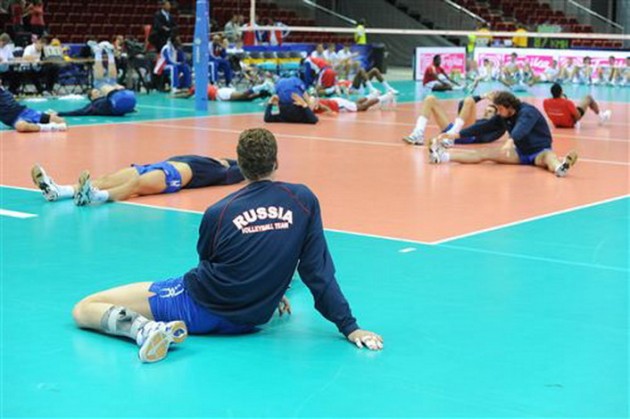
Stretching
Flexibility is defined as a range of motion around a joint.
Stretching is a means of increasing flexibility.
A limited range of motion can compromise your volleyball playing skills or affect your ability to speed up or slow down when making plays on the court.
Before practice or competition
After a warm up, static stretching can be effective for increasing the elasticity of muscles that are tight and help decrease the likelihood of injuries. When static stretching for increased muscle length, a good time to static stretch may be after a foam roll routine.
If static stretches are performed prior to a workout requiring explosive movements, the stretches may be counterproductive. Muscles are less responsive during the time immediately after static stretching. Static stretches confuse muscle and tendon reflexes which may throw off an athletes coordination.
A volleyball warm up should contain volleyball dynamic flexibility exercises. Dynamic means the stretching is active. Stretching while you’re moving warms up your body, preparing for movement while also activating your nervous system.
After practice or competition
Static stretching after a workout may be the best time because your muscles are warmed up. The increased muscle temperature increases the elastic properties of the muscle and therefore allows for a greater stretch. Stretching can be used as part of a cool-down which will help restore the muscle back to resting length, reduce soreness, and enhance recovery for the next volleyball workout.
Only static stretch with reason
Static stretching often feels good and can be relaxing, but static stretching isn’t always necessary. Only static stretch with a purpose. If you already have adequate flexibility, you are probably wasting your time. In fact, overly lengthened muscles can lead to problems such as muscular imbalances, thrown off muscular firing patterns, and possibly injury.
An increase in flexibility may come at the expense of giving up stability or explosive power necessary for your volleyball performance.
A flexibility deficiency rarely occurs in isolation. Flexibility is usually related to a deficiency in strength and sometimes posture. Tight athletes have been known to significantly improve their flexibility just by participating in a balanced volleyball training program.
Check out the news from our Phisiotherapy section, every Monday a new story! Tomorrow read about Facet Syndrome.